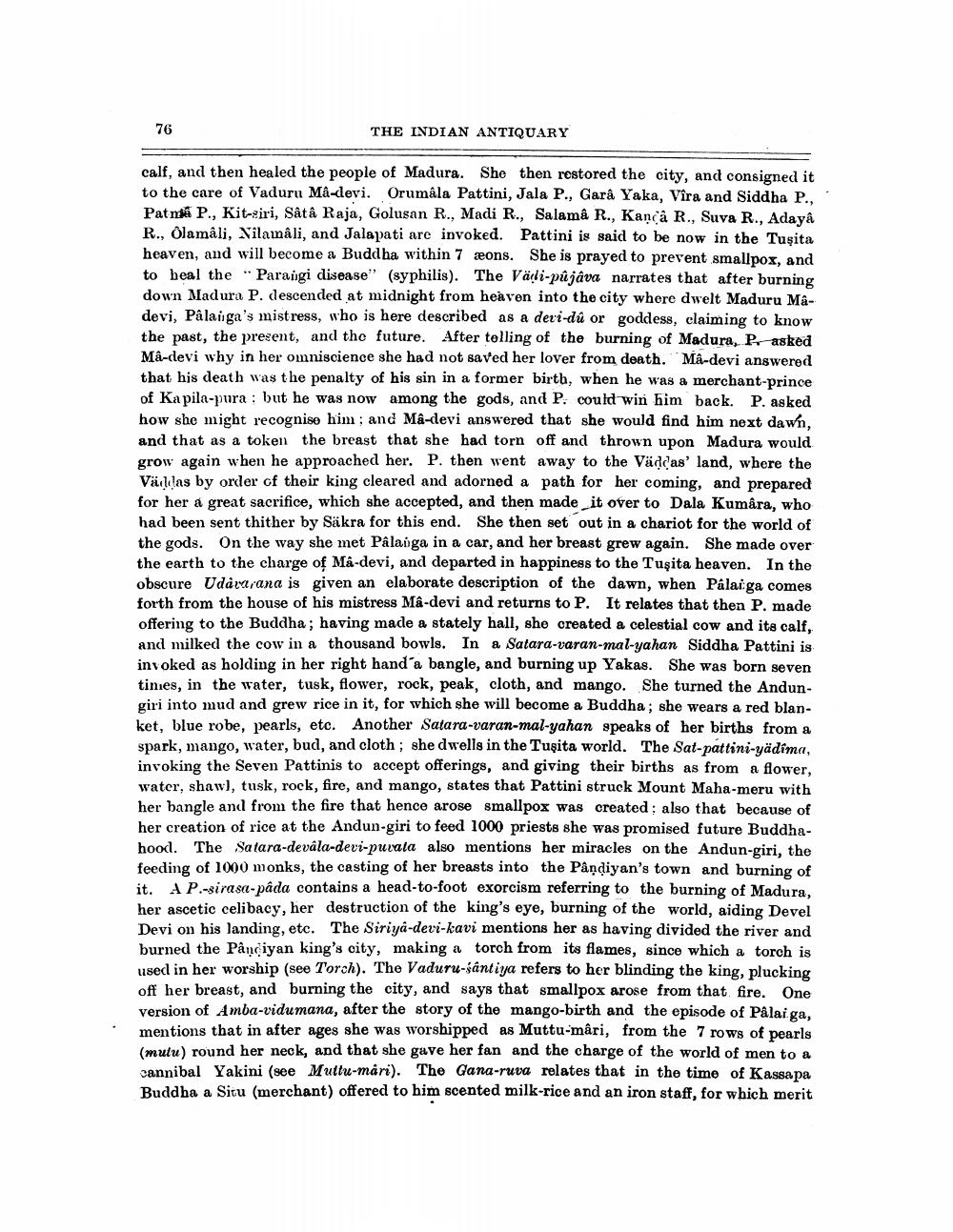________________
76
THE INDIAN ANTIQUARY
calf, and then healed the people of Madura. She then restored the city, and consigned it to the care of Vaduru Ma-devi. Orumala Pattini, Jala P., Gara Yaka, Vîra and Siddha P., Patná P., Kit-siri, Satâ Raja, Golusan R., Madi R., Salamâ R., Kanca R., Suva R., Adaya R., Olamali, Nilamâli, and Jalapati are invoked. Pattini is said to be now in the Tuşita heaven, and will become a Buddha within 7 æons. She is prayed to prevent smallpox, and to heal the - Paraigi disease" (syphilis). The Värli-půjâva narrates that after burning down Madura P. descended at midnight from heaven into the city where dwelt Maduru Madevi, Palanga's mistress, who is here described as a devi-dú or goddess, claiming to know the past, the present, and the future. After telling of the burning of Madura, Po asked Mâ-devi why in her omniscience she had not saved her lover from death. Mâ-devi answered that his death was the penalty of his sin in a former birth, when he was a merchant-prince of Kapila-pura : but he was now among the gods, and P. could win him back. P. asked how she might recognise him; and Mâ-devi answered that she would find him next dawn, and that as a token the breast that she had torn off and thrown upon Madura would grow again when he approached her. P. then went away to the Vädcas' land, where the Vädelas by order of their king cleared and adorned a path for her coming, and prepared for her a great sacrifice, which she accepted, and then made it over to Dala Kumâra, who had been sent thither by Säkra for this end. She then set out in a chariot for the world of the gods. On the way she met Palaiga in a car, and her breast grew again. She made over the earth to the charge of Ma-devi, and departed in happiness to the Tuşita heaven. In the obscure Udåvarana is given an elaborate description of the dawn, when Palaiga comes forth from the house of his mistress Mâ-devi and returns to P. It relates that then P. made offering to the Buddha; having made a stately hall, she created a celestial cow and its calf, and milked the cow in a thousand bowls. In a Satara-varan-mal-yahan Siddha Pattini is invoked as holding in her right hand a bangle, and burning up Yakas. She was born seven tines, in the water, tusk, flower, rock, peak, cloth, and mango. She turned the Andungiri into mud and grew rice in it, for which she will become a Buddha; she wears a red blanket, blue robe, pearls, etc. Another Satara-varan-mal-yahan speaks of her births from a spark, mango, water, bud, and cloth; she dwells in the Tuşita world. The Sat-pattini-yädima, invoking the Seven Pattinis to accept offerings, and giving their births as from a flower, water, shaw), tusk, rock, fire, and mango, states that Pattini struck Mount Maha-meru with her bangle and from the fire that hence arose smallpox was created : also that because of her creation of rice at the Andun-giri to feed 1000 priests she was promised future Buddhahood. The Satara-devala-deri-purala also mentions her miracles on the Andun-giri, the feeding of 1000 monks, the casting of her breasts into the Pândiyan's town and burning of it. AP-sirasa-pâda contains a head-to-foot exorcism referring to the burning of Madura, her ascetic celibacy, her destruction of the king's eye, burning of the world, aiding Devel Devi on his landing, etc. The Siriya-devi-kavi mentions her as having divided the river and burned the Pandiyan king's city, making a torch from its flames, since which a torch is used in her worship (see Torch). The Vaduru-santiya refers to her blinding the king, plucking off her breast, and burning the city, and says that smallpox arose from that, fire. One version of Amba-vidumana, after the story of the mango-birth and the episode of Pålai ga, mentions that in after ages she was worshipped as Muttu-mari, from the 7 rows of pearls (mutu) round her neck, and that she gave her fan and the charge of the world of men to a annibal Yakini (see Muttu-mari). The Gana-ruva relates that in the time of Kassapa Buddha a Situ (merchant) offered to him scented milk-rice and an iron staff, for which merit




